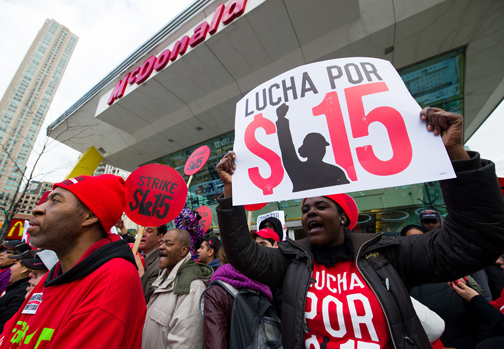
Pat Barcas/staff photographer
Low-wage workers and their supporters picket a McDonald’s in their effort to boost their base pay to $15 an hour.
By Pat Barcas
Staff writer
Thursday, May 22, 2014
Email Pat Barcas at pat@foxvalleylabornews.com
CHICAGO — May 15 saw a worldwide walk out as fast food workers rallied for a living wage. Protests were planned all day at fast food establishments in 150 cities worldwide.
Outside the Rock ‘n’ Roll McDonald’s at 600 N. Clark in Chicago, workers and activists alike gathered at 6 a.m. to ask for $15 per hour, and the right to unionize without retaliation.
“I think $15 per hour will provide some opportunities for students who are burdened by student debt,” said Miriam Socoloff, who is a teacher. “People should make a living by working a full time job. They are fed up with the insatiable greed of these corporations. Most people know it’s not right, they have to act. I think companies are responsive to this type of protest.”
This is the fifth fast food worker protest in Chicago. Many of the workers, who make the minimum wage of $8.25 per hour and are part-time, rely on government assistance, food stamps and Medicaid, to pay bills.
“Even $10, if you do the math, is not liveable,” said Sue Carrel, who was out protesting with the Seniors Activist Caucus. “The cities are becoming a place for the very wealthy. It’s totally unfair.”
The union-backed organization “Low Pay Is Not OK” released a poll in April that found 92 percent of fast food workers in Chicago have been a victim of one form of wage theft. The Workers Organizing Committee of Chicago, which has registered as a union and is funded by the Service Employees International Union, has been asking the workers to join up voluntarily.
The members are not required to pay dues, but they are encouraged to attend meetings and activist rallies, such as the one on May 15.
The group says $15 per hour is the bare minimum to survive in Chicago, and fast food jobs are quickly becoming careers as the middle and lower class get squeezed in the current economy.
